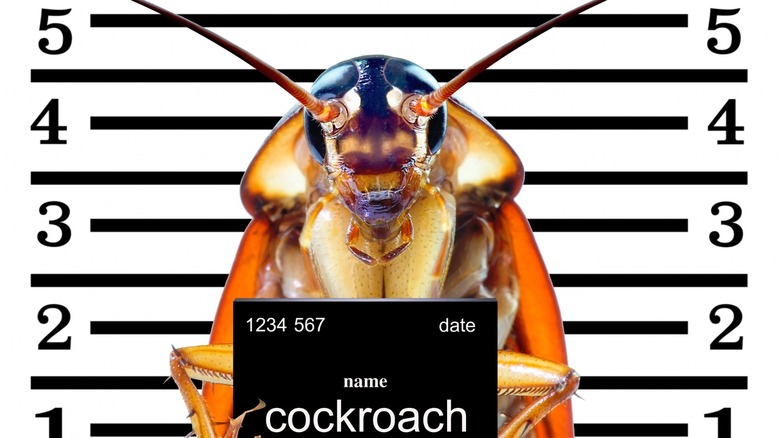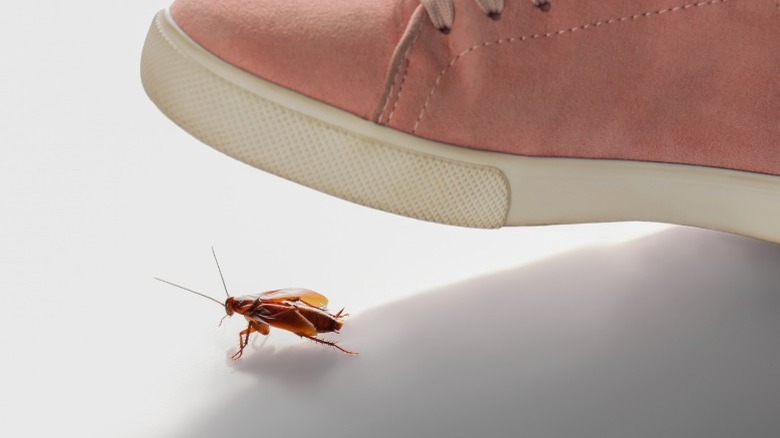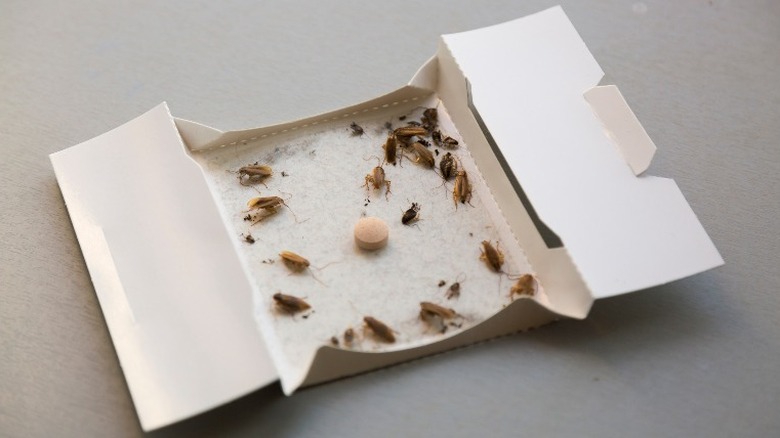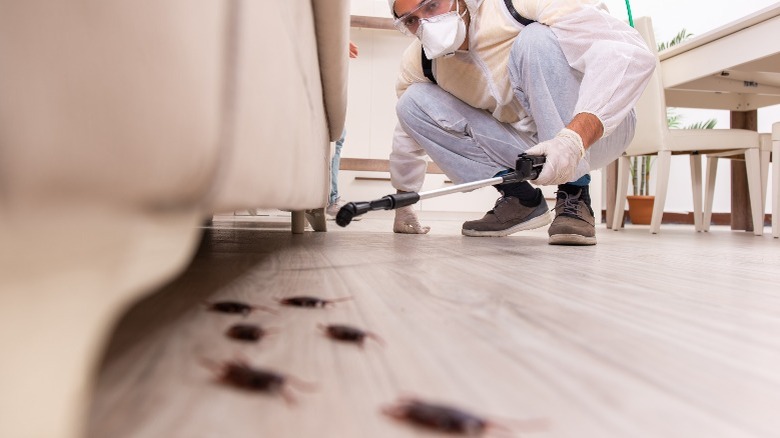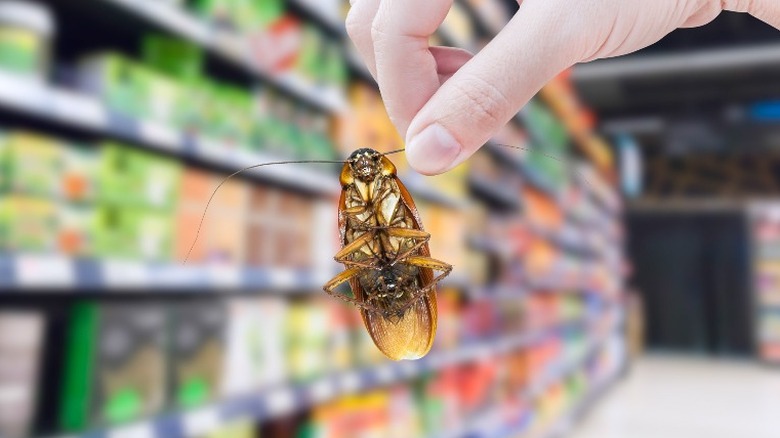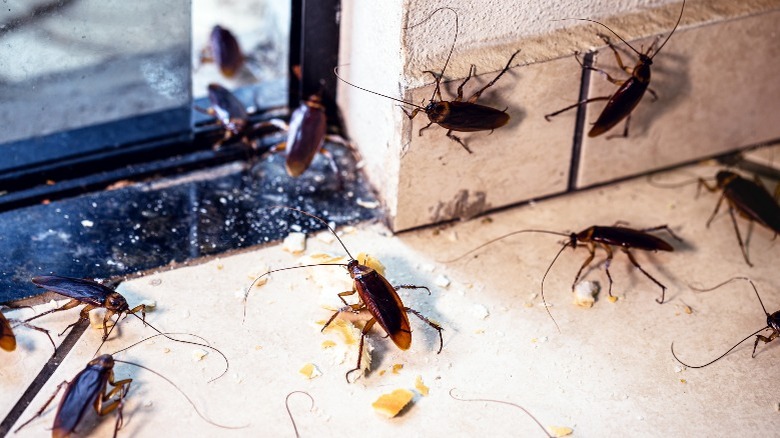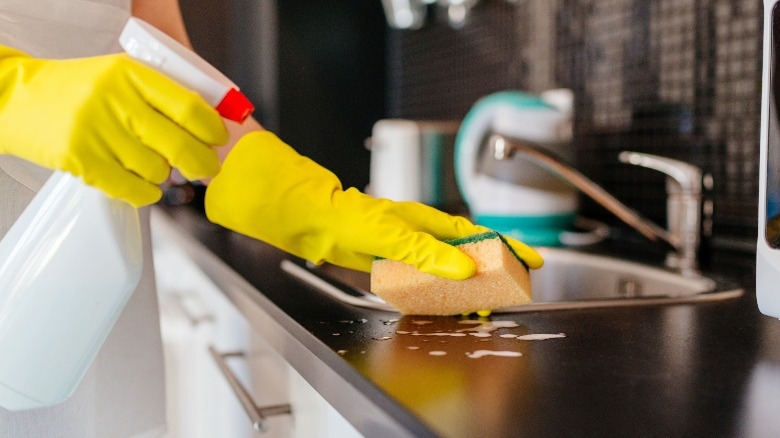How To Get Rid Of Cockroaches Forever
Let's be honest; just about everybody dislikes cockroaches. Perhaps this is due to their slimy-looking bodies or their long probing antennae or maybe because of their erratic movements, high speed, or apparent lack of fear. TIME points out that although roaches look revolting and thrive in dank, wet areas like basements and sewer systems, they actually pose little threat to our health. Having said that, they are still unwelcome pests in our homes, especially in the kitchen or anywhere that food is stored or prepared.
Unfortunately, TIME also noted that roaches had been around since the Jurassic period, which is a good indication of their resilience. They are extremely prolific and can live for up to a month without food or water and can even survive for a week without a head (via Pest World For Kids). While it is true that cockroaches are difficult to get rid of, particularly if a home becomes infested, there are, thankfully, several effective ways to eradicate them and certain steps that can be taken to prevent them from returning.
Should you squash a cockroach?
You may have heard that you shouldn't squash a cockroach as it will cause the female to release its eggs, thus compounding the situation. However, as Prime Pest Solutions explains, this is actually a myth. In fact, squashing a cockroach is a pretty effective method of dealing with it if you have the stomach for the clean-up afterward! Besides, the cockroach has likely already safely deposited her eggs someplace else; and even if it didn't, they wouldn't survive a human foot squash.
Still, the worst thing you can do is walk on a roach and hope it goes away. There are almost certainly many more cockroaches lurking in walls and other nooks and crevices where one is found explained Pest & Lawn Solutions. So, ensure you mind this and take steps to get rid of them altogether. Since female roaches can lay up to 48 eggs at a time, it is vital that you assess and deal with the situation immediately to prevent a more serious problem in the future.
Kill or capture?
As mentioned, cockroaches are extremely resilient, and regular bug spray may have little effect on them. For this reason, Insider recommends using an insecticide designed specifically for roaches. Another good option is cockroach bait, which is food laced with poison. After the cockroach ingests the poison, it will usually die within one to three days. However, these methods are not without their own drawbacks; if you have small children or pets, then it isn't a good idea to place poison around the home, warned Insider. Additionally, since it will take time for the cockroach to die, it will probably perish wherever it has made its nest, and its decaying body will undoubtedly attract even more cockroaches.
Alternatively, Terminix suggested using a glue trap. Place the glue trap in an area where you have identified roach activity; as the cockroaches run over the glue, they will become stuck to its adhesive surface, making it easy for you to dispose of. Suppose you notice several bugs in one area. In that case, this could indicate a more severe problem or, in the worst case, an infestation, which may be better dealt with by a professional pest control service.
Identify nesting areas
Cockroaches like warm, dark, and moist areas such as beneath the sink or toilet, underneath large appliances, or in dark corners of basements and closets, noted Smith's Pest Management, so these are areas to consider setting glue traps or laying bait. Using glue strips to identify roach problem locations is a good idea. The trap's scent attracts roaches, and the glue catches them after they tread on the strip. Place store-bought adhesive strips in any area where you've witnessed roach activity, such as behind the fridge or under the sink, for optimum results. Additionally, anywhere where there is a food source is another likely spot for roaches to nest.
A study conducted by the College of Agriculture, Food and Environment noted that cockroaches are more active at night when they leave their hiding places in search of food and water. Roaches will eat human food and just about anything else, including soap, toothpaste, feces, glue, hair, and even paper; therefore, precautions like taking out the trash and cleaning the dishes before going to bed will help prevent them from making a home in your house.
Controlling cockroaches naturally
There are several common household products that make an effective alternative if you prefer not to use harmful poisons or sprays around your home. The Spruce recommends various home remedies that are known to combat cockroaches: For example, borax, which is a natural mineral, is sold as a cleaning agent in most grocery stores and is also highly poisonous to roaches. Mix the borax with something sweet like honey or powdered sugar and leave it as bait in areas with cockroach activity.
Another suggestion from The Spruce is diatomaceous earth, which gardeners commonly use to combat slugs, snails, and ants. However, if you have pets, these options will not be suitable as they can be harmful to them. In this case, a better alternative is essential oils. Purchase peppermint or lemongrass essential oil and dilute it with a little water for optimal results. Essential oils shouldn't be used as bait, though; rather, they are only effective when sprayed directly onto the roach.
Protect your home
The old adage 'prevention is better than a cure' certainly holds true when it comes to cockroaches. DoMyOwn stated that there are a number of places around the home that may give roaches easy entrance. You should seal any cracks or crevices in external walls, masonry, or door and window frames with caulk. In addition, gaps under doors offer an easy access point for those bugs, and these should be sealed with a high-quality weatherstrip. Fixing leaky pipes under your sink or in the bathroom is also vital.
To permanently keep cockroaches from your property, it is also important to remove any possible nesting areas from your yard or garden, too. According to the Western Exterminator Company, roaches like clutter. Stacked items such as packaging, old newspapers, lumbar, and garden furniture all make a great home if you're a cockroach. Once those bugs have found a comfortable spot in your garden, it won't take long to start trying to get into your home.
Remove food sources
Like most animals, cockroaches are essentially just foraging for food; therefore, one of the best ways to keep them at bay is to ensure that there are no easy pickings in your kitchen or pantry. Rentokil recommends removing any standing water from sinks and draining areas and dealing with any leftovers before going to bed. Those bugs only consume small amounts of food, so even a few crumbs left on the table or the floor can provide them with a hearty meal. Cleaning up crumbs and doing your dishes is, thus, vital.
Better Homes & Gardens also pointed out that roaches can chew through cardboard packaging and plastic bags, which means the way you store your food is also important. Better Homes & Gardens suggest transferring dry food such as cereals, biscuits, or pasta into Tupperware or glass containers with well-sealing lids as a precautionary measure. Removing standing water from containers and sinks can also help keep cockroaches out of your home when they're looking for a place to drink.
Clean regularly
Perhaps the most important step for dealing with cockroaches is to clean your home thoroughly and regularly, especially in areas where food is stored and prepared. Remember that roaches require three things to survive: food, water, and a safe place to live. While you can't completely exclude these elements from the outside, you can make your property less inviting to them by cleaning up frequently inside and outside. To prevent them from getting into your yard in the first place, ensure you remove woodpiles, leaf piles, and overgrown underbrush. You should also secure outdoor trash can lids and trim foundation plantings away from the house.
Since cockroaches will feed on just about anything, DoMyOwn stressed the importance of a good cleaning regimen. Daily diligence will help prevent the build-up of dirt or potential food sources and should include removing grease and spills from appliances and cleaning cabinets used to store food. Vacuuming the kitchen floor before bed, whipping down countertops with antibacterial spray each night, and washing and drying pet dishes after feeding is also important.
